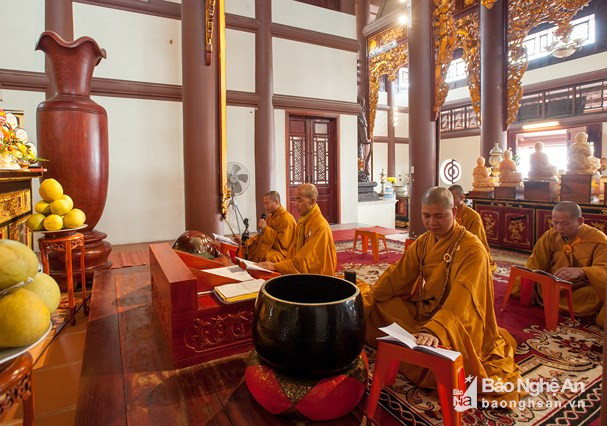The meaning of chanting sutras and reciting Buddha's name
(Baonghean.vn) - Chanting sutras, reciting mantras, and reciting Buddha's name are three methods of practice that are complete in both form and principle. Whether at home or ordained, whether Hinayana or Mahayana, negative or positive, no one can avoid these three methods because Buddhists need to learn to chant sutras, recite Buddha's name, and recite mantras so that their words and actions are consistent, in order to achieve good results.
Chanting sutras is to reverently read the Buddha's teachings in the scriptures, in accordance with the truth and the capacities of living beings. Reciting mantras is to firmly grasp the secret words of the Buddhas. Mantras have immeasurable power and merit, eliminating karmic obstacles, eliminating disasters and increasing blessings and wisdom, so they are also called mantras. Reciting Buddha's name is to remember the Buddha's name, visualize the Buddha and his virtues, and always strive to follow in his footsteps.
 |
| Monks and Buddhists commemorate the souls of the great patriarchs and predecessors who contributed to the construction of the pagoda. Photo courtesy: Thanh Cuong |
In Buddhism, if a Buddhist only worships, bows, and makes offerings to the Buddha, he cannot be called a pure Buddhist. A pure Buddhist must also chant sutras, recite mantras, and recite the Buddha's name. If the latter three parts are ignored, then the first three parts of worship, bows, and offerings will hardly be able to fully combine both the Matter and the Principle.
The Principle part is a profound part that is difficult to practice. If we do not chant sutras and recite Buddha's name to make our minds clear and enlightened to the profound and mysterious reasons in the sutras, then we will not be able to achieve the four prostrations that belong to the Principle.
The four prostrations include: the ceremony of generating pure wisdom, the ceremony of entering the Dharma realm, the ceremony of correct contemplation, the ceremony of equality of true nature, and the five wonderful incenses to offer to the Buddha: the incense of precepts, the incense of concentration, the incense of wisdom, the incense of liberation, and the incense of liberation knowledge. And if one cannot practice the four prostrations of the Principle and offer the five wonderful incenses, then the prostrations and offerings are only the "Actual" part, the formal part.Therefore, it is difficult for believers to progress on the path of the Dharma.
Believers must recite the Three Worlds Buddha:
- Reciting Buddha Shakyamuni is reciting the present Buddha, who is also the Buddha Teacher of all living beings.
- Reciting Amitabha Buddha is reciting the Buddha who was born in the distant past, and is also the Buddha who guides sentient beings to the Pure Land.
- Reciting Maitreya Buddha is reciting the Buddha of the future.
When we chant sutras, recite mantras, recite Buddha's name, strike wooden fish, ring bells, and count beads, our minds must be cleansed of all unrighteous thoughts and base desires, and the image of the Compassionate One must be brought into focus. Then we must follow His example, open our hearts to great compassion, think of the suffering of all beings, and vow to use our strength to bring joy and relieve suffering to all. When we stop chanting and re-engage with worldly affairs, we must make our actions as compassionate as our thoughts and words.

